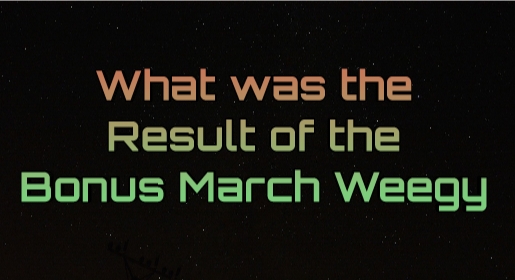What was the Result of the Bonus March Weegy: The Bonus March, a significant event in American history, was a gathering of World War I veterans in Washington, D.C., during the summer of 1932. These veterans sought the early payment of a promised cash bonus for their wartime service.
In this article, we will explore the outcome of the Bonus March and its impact on the veterans’ movement and American society as a whole. By examining the historical context, the government’s response, and the long-term effects, we can gain a deeper understanding of the Bonus March and its significance in shaping the course of history.
Table of Contents

Background and Objectives of the Bonus March
The Bonus March originated from the desire of World War I veterans to receive their promised bonuses earlier than the scheduled date of 1945. These veterans, many of whom were suffering from the effects of the Great Depression, faced economic hardship and sought financial relief. Their objectives included raising awareness about their plight, urging Congress to pass legislation for early bonus payments, and securing immediate relief for their families.
Government Response and the Eviction
The Bonus Marchers established makeshift camps in Washington, D.C., and engaged in peaceful protests and demonstrations. However, the government, under the administration of President Herbert Hoover, responded with a heavy-handed approach. On July 28, 1932, the military, led by General Douglas MacArthur, was ordered to evict the veterans from their encampments. The eviction turned violent, with tear gas and military force used against the veterans and their families. The actions taken by the government drew significant criticism from the public and further intensified the national debate surrounding the treatment of veterans.

Immediate and Long-Term Effects
What was the Result of the Bonus March Weegy: In the immediate aftermath of the Bonus March, public sentiment largely turned against President Hoover, whose handling of the situation was seen as callous and unsympathetic. The incident highlighted the challenges faced by veterans and drew attention to the dire economic conditions during the Great Depression.
In the long term, however, the Bonus March contributed to changes in government policies and support for veterans. The subsequent passing of the Bonus Act in 1936 provided early payment of the bonuses, bringing relief to the veterans and their families. The Bonus March also helped pave the way for the creation of the G.I. Bill in 1944, which provided education, housing, and unemployment benefits to World War II veterans.

Conclusion What was the Result of the Bonus March Weegy
The Bonus March was a pivotal event in American history that showcased the struggles faced by World War I veterans during the Great Depression. While the immediate outcome of the Bonus March itself involved a violent eviction and a negative public perception of President Hoover, the long-term effects were more significant.
What was the Result of the Bonus March Weegy: The movement led to policy changes and a greater focus on supporting veterans, culminating in the passage of the Bonus Act and the establishment of the G.I. Bill. By understanding the outcome and legacy of the Bonus March, we can appreciate its role in shaping the treatment of veterans and the development of social policies in the United States.